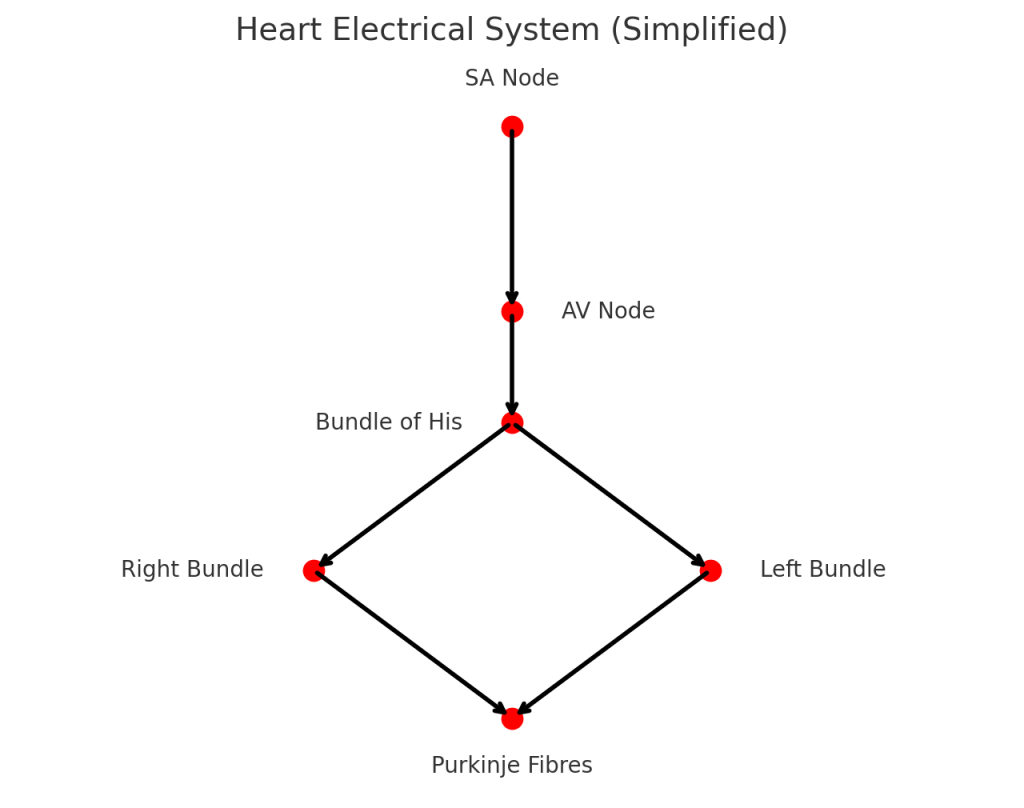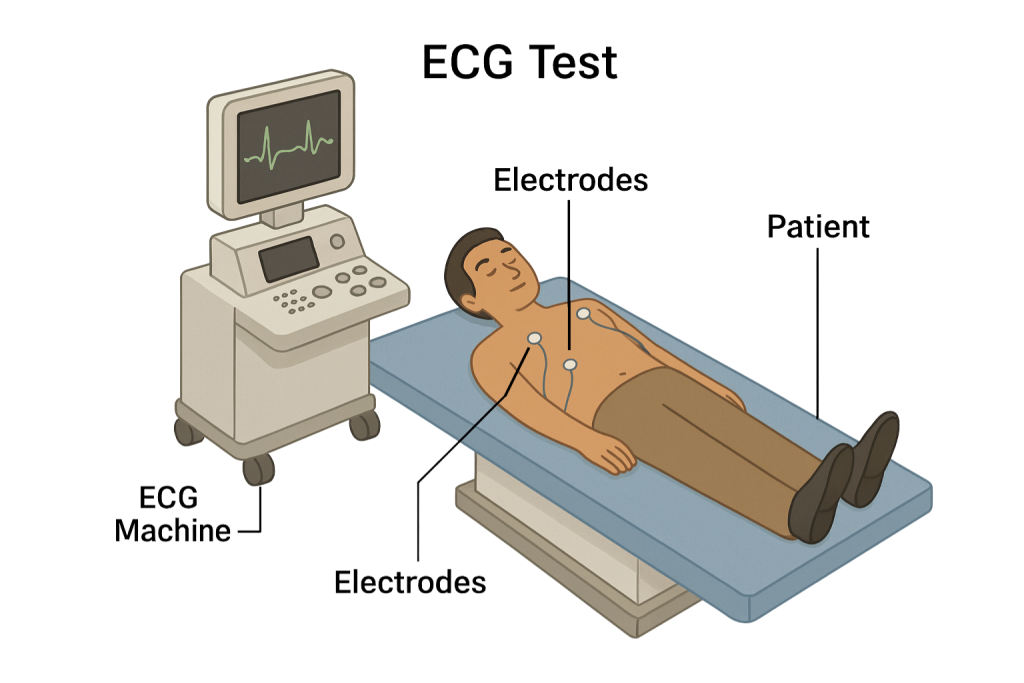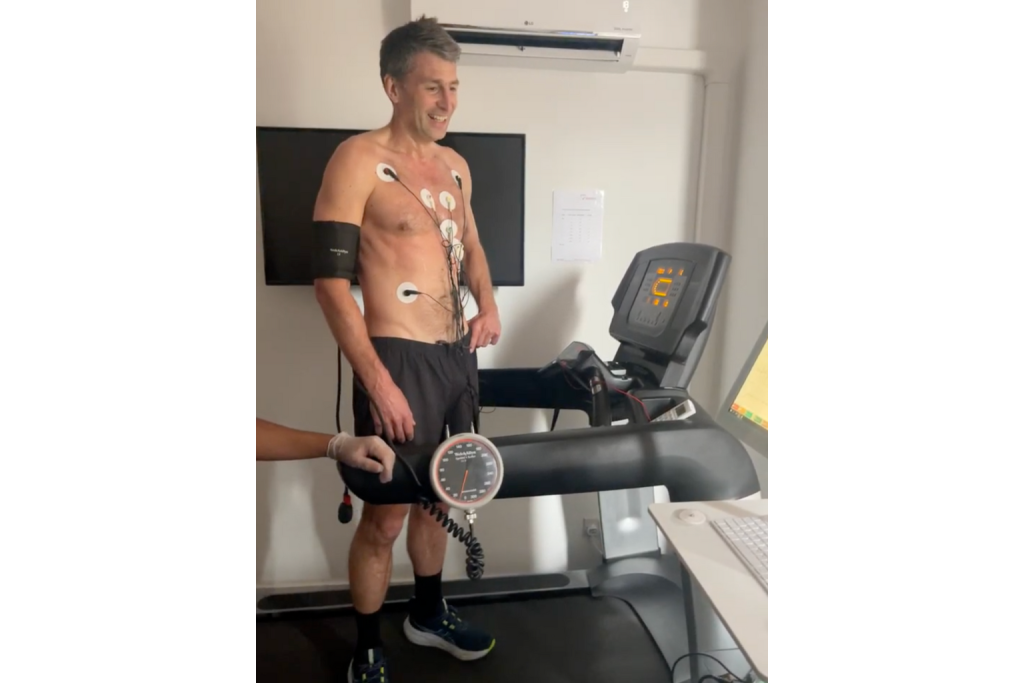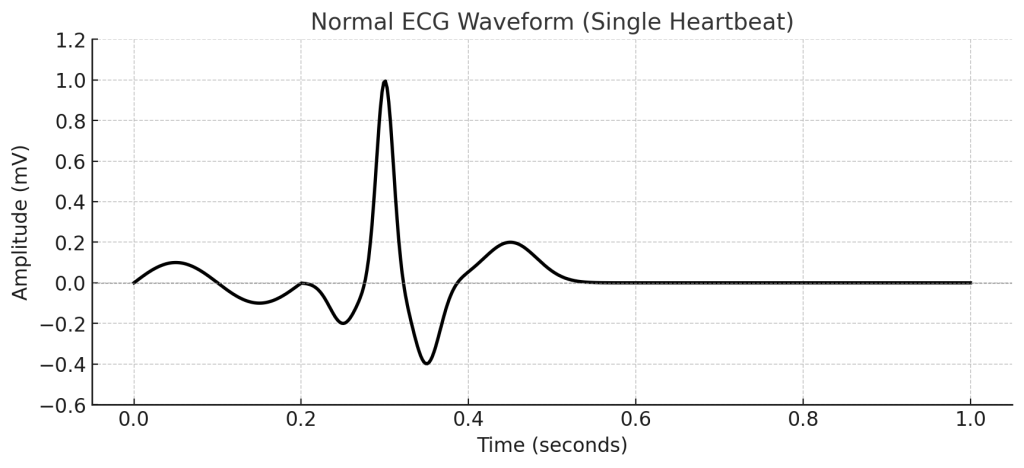An ECG test, also called an electrocardiogram, is a simple and painless way for doctors to check how your heart is working.
It records the electrical activity of the heart and shows whether it is beating normally. The test is quick, safe, and widely used in hospitals, clinics, and GP surgeries. ECG tests are important because they help doctors spot heart problems early. They can show if your heartbeat is irregular, if the heart is under strain, or if there has been damage such as a heart attack.
The heart beats because of tiny electrical signals that travel through it. These signals make the heart muscles contract and pump blood around the body. If the signals are too fast, too slow, or disrupted, the heartbeat may not be regular. An ECG test records these signals and draws them as a graph with waves and spikes. Each part of the graph shows a stage of the heartbeat cycle, giving doctors clues about how well the heart is working.

The heart’s electrical system starts in the sinoatrial (SA) node, which is the natural pacemaker. The signal then moves to the atrioventricular (AV) node, where it pauses slightly to let the atria contract. From there, it travels down the Bundle of His, which splits into the right and left bundle branches. Finally, the impulse spreads through the Purkinje fibres, making the ventricles contract and pump blood.
During the test, small sticky pads called electrodes are placed on your skin. These are usually put on the chest, arms, and legs. The pads are connected by wires to the ECG machine, which records the heart’s electrical activity.
You will be asked to lie still while the machine records for a few seconds or minutes. The results are shown on a screen or printed out for a doctor to read. The test does not hurt, and the only thing you may feel is the coolness of the pads when they are placed on your skin.

Doctors recommend an ECG test when someone has symptoms that could be linked to the heart. This includes chest pain, palpitations, dizziness, fainting, or shortness of breath.
It can also be done if you already have heart disease, to monitor your condition, or if you are taking medicines that may affect the heart. Some people have an ECG before surgery to check that their heart is healthy enough for anaesthetic.
Yes, there are a few types depending on what the doctor needs to find out.
The most common is a resting ECG, which is done while lying still. This shows how the heart works at rest.
Another type is an exercise ECG, also called a stress test. This is done while walking on a treadmill or cycling on an exercise bike. It helps doctors see how the heart responds to physical activity.
There is also a Holter monitor, which is a small device you wear for 24 hours or longer. It records the heart’s activity over a full day, picking up irregularities that may not appear during a short test.

An ECG test can give a lot of useful information. It can show if your heart is beating too quickly or too slowly, or if the rhythm is irregular. It can also show signs of a previous heart attack, problems with blood flow to the heart, or changes caused by conditions such as high blood pressure.
Sometimes an ECG shows small changes that suggest the heart is not getting enough oxygen. This can be a warning sign of angina or blocked arteries.
A resting ECG usually takes about 5 to 10 minutes, including the time to attach the electrodes. The recording itself only takes a few seconds. Exercise ECGs and Holter monitoring take longer, but even then, the process is simple and non-invasive.
There is very little preparation needed. You may be asked to remove jewellery or clothing from the upper body so that electrodes can be placed on the skin. Sometimes men may need a small area of chest hair shaved to help the pads stick properly. Otherwise, you can eat, drink, and take your medicines as normal unless told otherwise by your doctor.
After a resting ECG, the electrodes are removed, and you can go straight home or back to your normal activities. The results may be available immediately, or they may need to be reviewed by a cardiologist. If anything unusual is found, your doctor may suggest further tests, such as blood tests, an echocardiogram, or a heart scan.

No, an ECG cannot detect every heart issue. Some problems only happen from time to time, which is why longer monitoring may be needed. For example, an irregular heartbeat might not appear during a short test but could be caught with a Holter monitor.
Other heart conditions, such as minor valve problems, may not show up on an ECG and may need other scans or tests. An ECG is usually the first step in finding out what is wrong, but it may need to be combined with other investigations.
An abnormal result does not always mean something is seriously wrong. Sometimes changes are due to harmless variations in heart rhythm, or even technical factors such as how the electrodes were placed. Doctors always look at ECG results alongside symptoms and medical history to decide what they mean.
If the ECG does show a problem, it might point to conditions such as atrial fibrillation, angina, or evidence of a past heart attack. It may also reveal if the heart is enlarged or if the electrical system is not working as it should.
Most healthy people do not need an ECG test unless they have symptoms or risk factors for heart disease. However, some doctors recommend them for older adults, athletes, or people with strong family histories of heart conditions. The NHS usually offers ECGs only when there is a clear medical reason.
Private health checks sometimes include ECGs as part of routine screening. Whether this is necessary depends on the individual. For most people, lifestyle choices such as eating well, exercising, and not smoking do more for heart health than having extra tests.
An ECG test is a safe, simple, and quick way to record the heart’s electrical activity. It helps doctors diagnose irregular heartbeats, blocked arteries, and other heart conditions. While it cannot detect everything, it is an important first step in checking heart health. The test is painless, takes only a few minutes, and can give valuable information about how the heart is working.
Disclaimer: Seonat provides general health information for educational purposes only. This content is not a substitute for professional medical advice, diagnosis, or treatment. Always seek the advice of your GP or another qualified health provider with any questions about a medical condition or before making health decisions.

Simplifying health information for those who need it most
Please note: we are not medical professionals, and the content on this website is for general information only. Always speak to a qualified healthcare provider for medical advice.